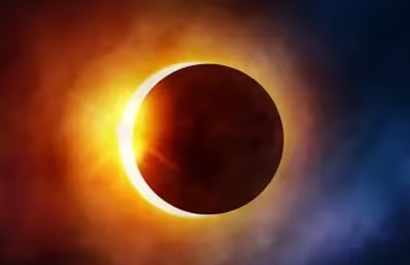A sun eclipse, one of nature’s most awe-inspiring events, occurs when the moon passes between the Earth and the sun, casting a shadow over Earth, fully or partially obscuring the sun’s light in some areas. This celestial phenomenon has fascinated humans for millennia, evoking wonder, fear, and awe in various cultures around the globe. Today, solar eclipses are not only a spectacle for the eyes but also a significant event for scientific research, providing unique conditions for studying the sun’s atmosphere, known as the corona. Lets learn about sun eclipse.

Types of Sun Eclipses
Solar eclipses are categorized into four primary types: total, partial, annular, and hybrid.
- Total Solar Eclipse: This occurs when the moon completely covers the sun, as seen from Earth. Observers in the path of the moon’s shadow, or the umbra, can see the sun’s corona, its outer atmosphere, which is usually obscured by the bright light of the sun’s surface. Totality provides a brief period of daytime darkness, cooling temperatures, and the appearance of stars and planets.
- Partial Solar Eclipse: In a partial solar eclipse, only a part of the sun is obscured by the moon. This happens when the observer is located in the penumbra, the partial shadow cast by the moon. The sun appears as if a “bite” has been taken out of it, varying in size depending on your location.
- Annular Solar Eclipse: When the moon is too far from Earth to completely cover the sun, it leaves a ring-like shape of the sun’s surface visible. This is known as an annular eclipse, from the Latin “annulus,” meaning ring. The path where the annular eclipse is visible is called the path of annularity.
- Hybrid Solar Eclipse: Also known as a mixed eclipse, this rare event occurs when the same eclipse changes from annular to total, or vice versa, along different sections of its path. The curvature of the Earth’s surface and variations in the distance between the Earth and the moon can create this unique scenario.
The Science Behind Eclipses
Solar eclipses offer scientists valuable opportunities to study the sun’s structure and the dynamics of its atmosphere. The brief moments of totality during a total solar eclipse allow astronomers to observe the corona directly without the interference of the sun’s bright surface. Such observations have led to significant discoveries, including the identification of helium, a previously unknown element on Earth, found during a solar eclipse in 1868.
Viewing Solar Eclipses Safely
Looking directly at the sun, even during an eclipse, can cause permanent eye damage. To safely observe a solar eclipse, one must use solar viewing glasses that meet international safety standards or indirect viewing methods such as pinhole projectors. Telescope or binocular views require special solar filters to protect both the equipment and the viewer’s eyes.
Cultural and Historical Significance
Throughout history, solar eclipses have held profound significance for many cultures, often interpreted as omens or divine messages. They have influenced literature, art, and mythology, embodying the fears and fascinations of humanity towards the cosmos.
The Future of Eclipse Watching
With the advent of sophisticated prediction models, the exact paths and timings of future eclipses can be forecasted with remarkable accuracy. This has turned eclipse watching into a popular activity for both amateur enthusiasts and professional scientists, with many traveling to remote parts of the world to witness this natural phenomenon in its full glory.
A solar eclipse is not merely an astronomical event; it is a reminder of our place in the vast cosmos, a spectacle that connects us across time and cultures through the shared experience of wonder and discovery. As we continue to explore and understand these celestial events, we not only uncover more about the universe but also about ourselves and our collective imagination.

Leave a Reply